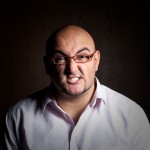
In 2013 an expert consensus group (Lobbezoo et al) defined bruxism as, ‘a repetitive jaw-muscle activity characterised by clenching or grinding of the teeth and/or by bracing or thrusting of the mandible. Bruxism has two distinct circadian manifestations: it can occur during sleep (indicated as sleep bruxism) or during wakefulness (indicated as awake bruxism).’ The aim of this review was to assess the effectiveness of treatments for the management of sleep bruxism (SB) in adults.
Methods
Searches were conducted in the Medline, Scopus and Google Scholar databases. All clinical trials, cohort studies (i.e. before–after case series) or before–after case reports of SB management diagnosed with polysomnography (PSG) or sleep time electromyography (EMG) were considered. Two reviewers independently selected studies; abstracted data and quality assessed the included studies. The Cochrane risk of bias tool and Critical Appraisal Skills Programme (CASP) cohort study checklist were used for the quality assessment. A narrative summary of the included studies was conducted.
Results
- 14 studies (12 RCTs, 2 uncontrolled before and after studies) were included.
- 7 studies (121 patients) considered oral appliances.
- 4 studies reported on pharmacological management- 2 used botulinum toxin and two clonazepam or clonidine.
- 2 studies considered sleep hygiene and relaxation techniques.
- 1 paper electrical stimuli to the masseter muscles.
- The quality of the RCTs was low to unclear and the 2 before and after studies had several methodological limitations.
Conclusions
The authors concluded: –
There is not enough evidence to define a standard of reference approach for the treatment of this phenomenon, with the exception of the use of oral appliances. Future studies focusing on the indications for SB treatment are recommended to provide a tailored approach to subjects with SB.
Comments.
This review supports the findings of a number of previous reviews of sleep bruxism in that there is little evidence on which to base treatment recommendations for this problem. A 2007 Cochrane review of oral appliances (Macedo et al ) was only able to include 5 RCTs finding:-
there is not sufficient evidence to state that the occlusal splint is effective for treating sleep bruxism. Indication of its use is questionable with regard to sleep outcomes, but it may be that there is some benefit with regard to tooth wear.
Separate reviews of biofeedback (Dental Elf – 3rd Jul 2013) and botulinum toxin (Dental Elf – 21st Mar 2012 ) have also identified little evidence as has the 2014 Cochrane review of pharmacotherapy for the management of sleep bruxism (Macedo et al).
Links
Manfredini D, Ahlberg J, Winocur E, Lobbezoo F. Management of sleep bruxism in adults: a qualitative systematic literature review. J Oral Rehabil. 2015 Jun 11. doi: 10.1111/joor.12322. [Epub ahead of print] PubMed PMID: 26095208.
Macedo CR, Macedo EC, Torloni MR, Silva AB, Prado GF. Pharmacotherapy for sleep bruxism. Cochrane Database Syst Rev. 2014 Oct 23;10:CD005578. doi: 10.1002/14651858.CD005578.pub2. Review. PubMed PMID: 25338726.
Dental Elf – 21st Mar 2012 – Botulinum toxin for bruxism
Macedo CR, Silva AB, Machado MAC, Saconato H, Prado GF. Occlusal splints for treating sleep bruxism (tooth grinding). Cochrane Database of Systematic Reviews 2007, Issue 4. Art. No.: CD005514. DOI: 10.1002/14651858.CD005514.pub2.
Lobbezoo F, Ahlberg J, Glaros A, Kato T, Koyano K, Lavigne GJ et al. Bruxism Defined and Graded: an International Consensus. J Oral Rehabil. 2013;40:2–4.

Little evidence for management of sleep bruxism in adults. http://t.co/oZsIVzgIkU
Review finds little evidence for management of sleep bruxism. http://t.co/oZsIVyZ7tm
Sleep bruxism little evidence for management fins review. http://t.co/oZsIVyZ7tm
Limited evidence for management of sleep bruxism. http://t.co/oZsIVyZ7tm
Don’t miss – Sleep bruxism: little evidence for management. http://t.co/oZsIVyZ7tm
[…] Sleep bruxism: little evidence for management […]
[…] Sleep bruxism: little evidence for management […]